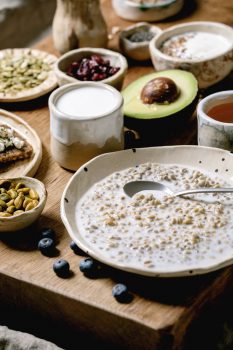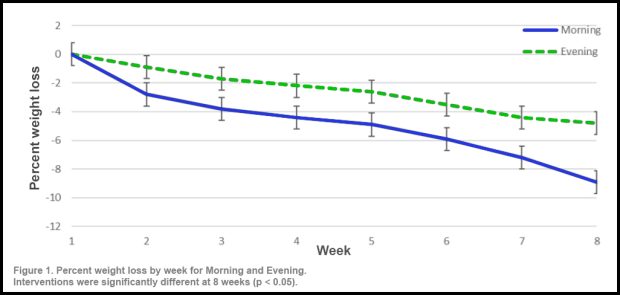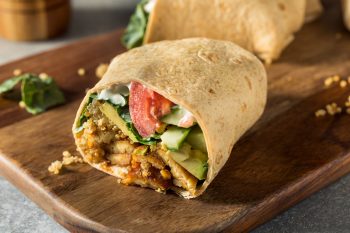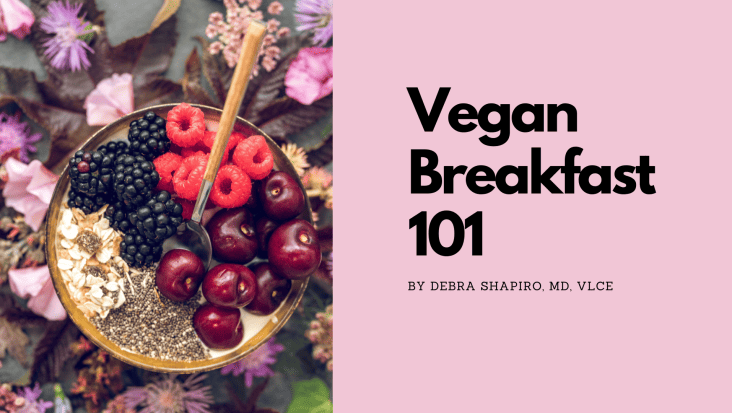posted January 23, 2024
Growing up, my standard breakfast was eggs and cheese, white toast and margarine. I even ate Spam cooked in fake maple syrup. My dad could whip up some tasty buckwheat pancakes on weekends, but his oatmeal was always lumpy, and I hated it. I wanted Lucky Charms or Cap’n Crunch. Looking back, I feel regret, yet a very strong desire to help others start their lives (and days) with more nutritious options.

I’ve been eating mainly whole plant foods for 11 years and experienced the usual benefits: effortless reduction in my weight, blood pressure, lipids, and blood sugar; improved energy; and happier mood. While I admit I don’t always eat breakfast, there is knowledge that I can share. You decide for yourself if eating more food in the morning is for you.
Breaking the Fast
The word “breakfast,” of course, refers to breaking the overnight fast. Many studies show the association of eating breakfast with slimmer bodies, but it’s not simply cause and effect. You can’t lose weight just by adding breakfast calories.
You Are When You Eat?
Humans are naturally inclined to sleep at night and be awake during the day. No matter how different you think you are from another human, we all share this chronobiology. As opposed to nocturnal animals, such as rodents, humans are hardwired to cycle metabolically in a near 24-hour light-dark circadian rhythm. Calories that you ingest at 8 a.m. are metabolized differently than calories ingested at 8 p.m.
Maybe people who eat breakfast eat less calories later in the day, keeping them slimmer? While this may be contributing, it’s actually not just the number of calories, but when the calories are ingested that matters most.
Studies clearly show eating your largest meal at the start of the day, a smaller meal at lunch, and a much smaller dinner, will lead to significantly more weight loss than the other way around.
This study[i] compared folks eating 700 calories (kcals) at breakfast, 500 kcals at lunch, and 200 kcals at dinner with a group eating 200 kcals for breakfast, 500 kcals for lunch, and 700 kcals at dinner. After just eight weeks, weight loss was significantly greater in the more caloric breakfast-eating group. The same number of calories were consumed per day, but arranged to maximize metabolism of those calories, taking advantage of the human subjects’ circadian rhythms.
Here is a graph of their results, with clearly more weight loss in the group eating most of their calories at breakfast.

What You Eat Matters Too

All this is important, because not all breakfasts are equal. If you want to see the benefits of weight loss associated with shifting your calories to earlier in the day, you can’t expect results eating hyper-processed, calorically dense food (vegan or not). Instead, eat a breakfast of whole or minimally processed plant foods early, finish the day’s eating early, and see what happens to your body. I feel optimally nourished steel-cut oats, soy milk, ground flax, wheat germ, walnuts, dried cherries, fresh berries, and Ceylon cinnamon. I’ve known people who enjoyed eating a colorful salad for breakfast! Dinner for breakfast works, too—a wrap of tofu or tempeh and veggies, for example.
3 Tricks to Maximize your Benefit of Added Morning Calories
- Eat healthy, whole plant foods full of fiber and other phytonutrients, avoiding chemicals, sodium, sugar, and oil.
- Consume most of your calories during the daytime, the earlier the better.
- Avoid eating after 7 p.m. Nighttime eating causes more weight gain and interferes with restful sleep.
WFPB Breakfast Recipe Resources
- Plant-Based Dietician
- Chef AJ
- Physician’s Committee for Responsible Medicine
- Jane and Ann Esselstyn
- Center for Nutrition Studies
- Forks Over Knives
[i] Raynor, Hollie A., et al., Daily Pattern of Energy Distribution and Weight Loss, Physiology & Behavior Volume 192, 1 August 2018, Pages 167-172

Debra Shapiro, MD has practiced medicine for over three decades, and is Board Certified in both Obstetrics and Gynecology and Lifestyle Medicine. She has been studying Plant-Based Nutrition for 11 years, with a Certificate from the T. Colin Campbell Center for Nutrition Studies.
Dr. Shapiro is a Certified Health Coach and a Main Street Vegan Academy Vegan Lifestyle Coach and Educator. Her passion is using plant-based nutrition and lifestyle medicine to prevent, treat and reverse chronic disease. In addition to individual coaching, she practices Lifestyle Medicine and Gynecology for the employees of a major corporation, and lectures at national conferences. She is a contributor to the 2022 ACLM textbook, Improving Women’s Health Across the Lifespan, and has appeared on numerous podcasts and in print magazines.
To start your transformation you can reach Debra through her website, A New View of Food, on Instagram, and Facebook.

